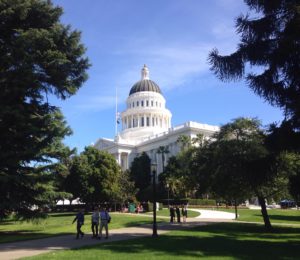Today, August 1, the State Legislature returned from its July recess and entered the home stretch of the 2-year legislative session, which will end by midnight on August 31 (and experience suggests that it’s not likely to finish up much before the stroke of midnight). Among the many issues on lawmakers’ plates are several key bills that would help clean up the air that we breathe and slow global warming. These bills include: SB 32, authored by Senator Fran Pavley, which would require the state to cut greenhouse gas emissions by 40% between 2020 and 2030; AB 1550, by Assemblymember Jimmy Gomez, which would send more of the climate investments to disadvantaged and low-income communities; SB 1383, by Senator Ricardo Lara, which would require substantial cuts in planet-warming “super-pollutants;” and SB 1387, which would reform the governance of the faltering South Coast Air Quality Management District.
A poll released July 28 by the Public Policy Institute of California, shows that Californians continue to overwhelmingly support policies to clean up pollution of our air and atmosphere. 69% of adults continue to support the Global Warming Solutions Act of 2006 (AB 32), and 68% support the major ratcheting down of emissions called for by SB 32. 56% are willing to pay more for electricity from clean renewable sources to reduce global warming, and a plurality agrees that the state’s climate policies will create more jobs in California. Support for policies that promote electric vehicles and solar power was over the 2/3 level in the poll. In an indication of support for AB 1550’s goal, 51% of Californians said it was very important, and 30% somewhat important, that a portion of cap-and-trade revenue be spent on projects to improve environmental conditions in lower-income and disadvantaged communities. Half of adults understand that air pollution is a more serious health threat in lower-income areas than elsewhere, a fact that is well-documented by monitoring data.
With that kind of popular support, one might think that passage of pollution-fighting legislation would be a slam dunk; but that would be ignoring the corrupting influence of big money, particularly the millions spent on campaigns and lobbying by the Big Oil companies. Companies like Chevron and Valero, and their trade group Western States Petroleum Association, have invested heavily in the Legislature, and the result is that a large bloc of oily Republicans and Democrats has been able to block most recent bills that would break our oil addiction. Last year, those oil-allied legislators blocked SB 32 and forced the removal from SB 350 of a provision to require a 50% reduction by 2030 in the amount of petroleum used in cars and trucks.
So the question left to be answered by the Assemblymembers this year is: will they vote to clean up pollution, as their constituents want, or will they instead vote to protect the profits of the oil companies?
[share title=”Share This Post”]








